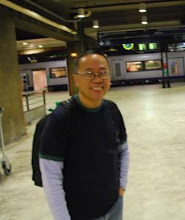 O CAPTAIN, MY CAPTAIN. Isabelo del Rosario y Tuazon, a Captain of the local Katipunan chaper, and two times a hero (Philippine Revolution and of the Philippine-American War).
O CAPTAIN, MY CAPTAIN. Isabelo del Rosario y Tuazon, a Captain of the local Katipunan chaper, and two times a hero (Philippine Revolution and of the Philippine-American War). There are many members in our over-extended clan that we consider as icons, idols and heroes. As a young boy, I looked up to so many uncles, aunts and an odd assortment of relatives who excelled in their fields as doctors, lawyers, ambassadors, government officials and even international news personalities. But by definition, there is one genuine, honest-to-goodness hero who shares our Del Rosario bloodline, a revolucionario whose dramatic execution has often been written about in local history books: Kapitan Isabelo del Rosario y Tuazon.
Kapitan Isabelo or Bikong is a cousin of my maternal grandfather, Emilio. Their fathers, Marcelino and Cornelio were brothers, children of Pablo del Rosario and Luisa de Ocampo. Born in San Fernando on 8 July 1878, Bikong was brought up by a strict but devout mother, Agueda Tuazon, from whom he learned the values of discipline, love of God, country—and music. He became a superb violinist, adept at playing the popular awits, danzas and kundimans of his time.
At age 18, Bikong joined the local chapter of the Katipunan and was elevated to the rank of a Kapitan for his exploits. At about this time, he married Emilia Abad Santos y Basco, a sister of Jose and Pedro Abad Santos (the future Supreme Court Justice was a friend of Bikong even before the war). This union was blessed with two sons, Pastor and Agapito.
The defeat of Spain by the Americans gave Bikong false hopes of returning to San Fernando to live a life of peace with his family. When it became apparent that the Americans were staying for good, he once again joined the war against the new colonizers. He said of the Americans: “Den ela sasaup...sasakup la” (they did not come to help, but to conquer).
The Philippine Insurrection, as the Americans called the war, proved to be short and bloody for the revolutionary forces. With the American military prevailing over the Filipinos, Kapitan Bikong and his fellow Kapampangan revolucionarios were asked to lay down their arms, surrender and gain pardons. But the brave Kapitan continued on with his fight and was subsequently captured at Sapa Libutad in 1901, shortly after the birth of his youngest son.
Taken to jail in Mexico, he was sentenced to die by hanging at the town plaza. His last request was to play his violin for one last time. With that final wish granted, he proceeded to play a moving version of “Danza Habanera de Filipina”. After which, he smashed his violin to smithereens on the gallows’ post where was to hang. Kapitan Bikong gave up his life for his beloved country on 12 April 1901, just 22 years old.
(POSTSCRIPT: Isabelo’s son, Agapito, became a Mayor of Angeles in 1940, during the Commonwealth Period. He was arrested for being anti-Japanese and imprisoned in Fort Santiago. Like his father before him, he chose to die for his country, dying at the hands of the Japanese in March 1942, age 41.).
(*NOTE: Feature titles with asterisks represent other writings and are not included in the original book, "Views from the Pampang & Other Scenes")








9 comments:
Another great entry, sir. You're lucky to trace your family roots and have a story about Philippine Revolution.
I've always wanted to do that. If I had the time (and of course, money) to go back to my grandfather's hometown, I want to know what was our family's role in the Revolution and the Philippine-American war. Sorry for digressing but your blog truly inspires.
Keep 'em coming. Thanks!
Many thanks for your kind words. I am sure you also have heroes in the family--and I am certain that we also have villains in our family closet! Salamat for droping by..
Alex
Intrigued that he was transported to Mexico for execution of sentence. Considering the frail relations between the USA and Mexico after the SWA, why would he be taken to Mexico, rather than simply tried and executed in the Philippines?
I am referring to a town in Pampanga, Philippines called Mexico.
As a poet, this story is so haunting to me. I love that his final gesture was to play a hispanized opera form (habanera) from their colony in Cuba that Filipinos like Ernesto Vallejo and your great-uncle took and made their own, and how empowering is the act of reclaiming that art from the colonizer and making it like a kundiman or patriotic love song. I wish I knew more about that stuff.
Thanks,Jake Eduardo. By the way, I also have written an article about Ernesto Vallejo.
Good day. I'm from the local government of San Fernando. We have an upcoming project this August 2020 for the National Heroes Day. With this project we will be needing a quotation or statement by a national or local hero. I would like to ask if you have other statements directly from Kapitan Bikong. Thank you
💛💛💛
Good afternoon Mr. Castro! I’m Christianne Serrano and on behalf of De La Salle University’s Animove Dance Group, we would like to formally invite you to watch our online production entitled Metung A Revolucionario. It is a creative story telling of Isabelo Del Rosario or aka Kapitan Bikong’s life. With this, may we kindly ask you for your email address so that we could send you further details about the production? You may also reach me through this email: christianne_serrano@dlsu.edu.ph. Thank you and God bless!
Post a Comment